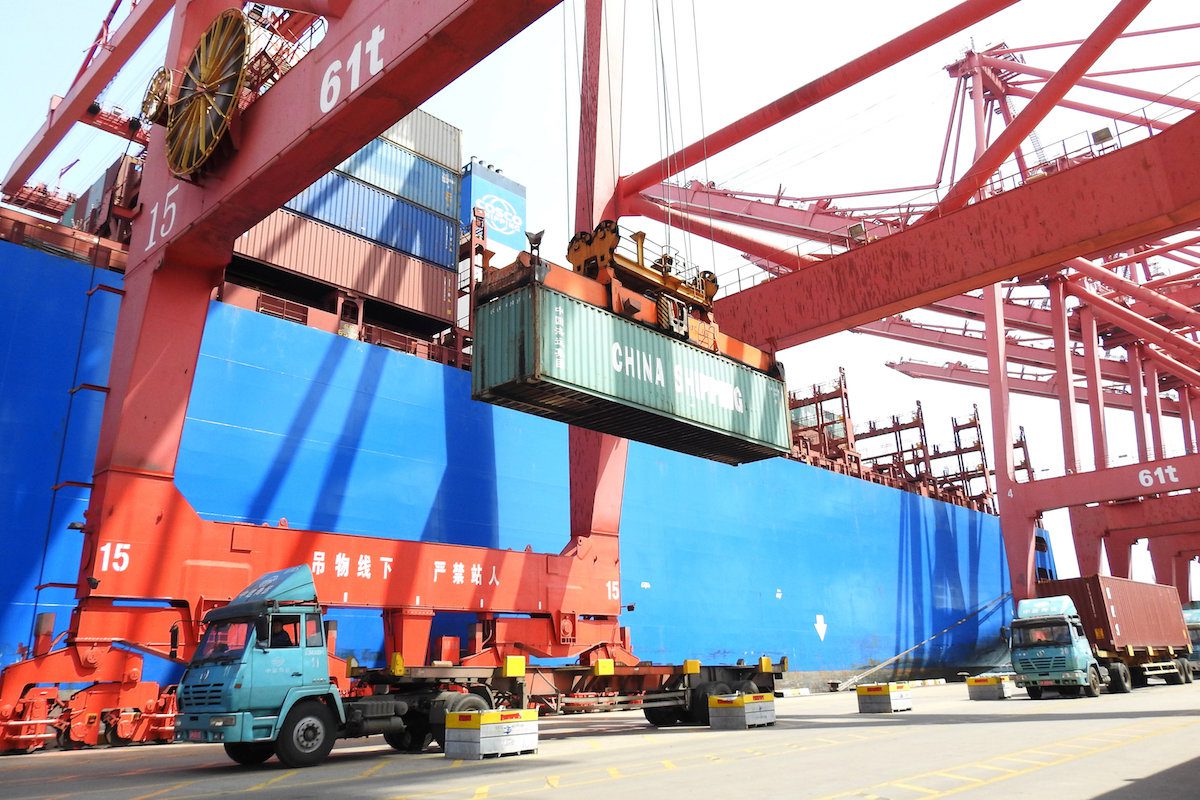A shipping container is loaded onto a truck at a port in Lianyungang, Jiangsu province, China April 6, 2018. REUTERS/Stringer
By Jenny Leonard, Saleha Mohsin and Jennifer Jacobs (Bloomberg) — Some U.S. negotiators are concerned that China is pushing back against American demands in trade talks as progress slows toward a deal that could give President Donald Trump a boost for his 2020 reelection bid, according to people familiar with the talks.
Chinese officials have shifted their stance with the view that while they have agreed to changes to their intellectual-property policies, they haven’t received assurances from the Trump administration that tariffs imposed on their exports would be lifted, two of the people said on condition of anonymity.
Beijing has also stepped back from its initial promises over data protection of pharmaceuticals, didn’t offer details on plans to improve patent linkages, and refused to give ground on data-service issues, one person familiar with the U.S.’s views said. Beijing is trying to bring in wording that would ensure rules in the trade agreement have to comply with Chinese laws, the person added.
U.S. Trade Representative Robert Lighthizer and Treasury Secretary Steven Mnuchin will travel to Beijing the week of March 25 for high-level talks to try and hammer out a deal that could be signed next month, the Wall Street Journal reported on Tuesday, citing unidentified people. Chinese Vice Premier Liu He will visit Washington the following week, the paper said.
In recent days, USTR has sent comments to its Chinese counterparts seeking to address concerns with language in China’s revised offer on intellectual-property protection, according to one person briefed on the discussions.
While some American officials see China’s strategy as backpedaling on commitments, others were less concerned saying it was a normal part of the negotiation process.
A person close to Lighthizer denied that Chinese officials have backed away from previous pledges. A Chinese official briefed on the talks said that the negotiations are still ongoing and that a back-and-forth is to be expected in such circumstances.
Trump is pushing for U.S. negotiators to close a trade deal with China soon, concerned that he needs a big win on the international stage to boost his reelection chances. Trump has repeatedly said that talks with China are “moving along nicely,” and said earlier this month that markets will experience “a very big spike” as soon as the trade deal is complete.
In recent weeks, possible dates for a signing of an accord between Trump and his Chinese counterpart Xi Jinping have been pushed back amid what Lighthizer has called “major” outstanding issues. The U.S. has said a trade deal with China must address its alleged theft of trade secrets and IP from American companies, regardless of any pledge from Beijing to buy more U.S. goods and services.
In video conferences over the past few weeks, the two countries have advanced a series of documents that would eventually become the trade agreement. On IP, U.S. and Chinese officials had come up with an almost 30-page text, Lighthizer told lawmakers this month.
The Ministry of Commerce and the State Council Information Office in Beijing didn’t immediately respond to request for comment on the negotiations. White House communications aides didn’t immediately respond to a question for comment.
Tariff Reversal
A deal between the U.S. and China could see them reverse tariffs on roughly $360 billion of goods they’ve imposed on each other’s imports since July.
Trump has twice delayed imposing additional tariffs on Chinese goods, that were scheduled to begin Jan. 1 and then March 1, citing progress in the trade talks. In recent weeks, investors had been heartened by signs that Trump is looking to sign a deal with Xi, possibly at a summit at Trump’s Mar-a-Lago resort in Florida.
The U.S. is pushing for enforceable targets after Trump and his trade team have criticized China for failing to live up to past promises.
U.S. and European business groups voiced skepticism about the effectiveness of a new law on foreign investment that China’s parliament rubber-stamped last week. The legislation, which is set to take effect next year, is supposed to put foreign-run enterprises on more equal footing with locally owned business and end forced technology transfers.
The American Chamber Commerce in China, however, said in a statement that it appreciated some “last-minute” changes in the laws to address the concerns of foreign investors, without offering details.
But the legislation’s lack of details, including on how it will be executed, has raised concerns it lacks teeth. Chinese Premier Li Keqiang said on Friday that China will protect IP and he hopes “foreign governments can view in an objective light the collaboration between Chinese and their foreign partners based on contractual consent.”
Bipartisan Issue
Trump has the benefit of bipartisan support for taking a tough approach on China, even from political adversaries in Congress. Senate Minority Leader Chuck Schumer, in multiple floor speeches in the past month, has urged Trump to hold the line and strike a strong and lasting deal with Beijing rather than resolve the trade war for a quick win.
Still, Trump has maintained the threat of abandoning the China talks. After walking out of a summit with North Korean leader Kim Jong Un in Hanoi last month, Trump stressed that he would be willing to do the same in a meeting with Xi if he didn’t like the terms of their deal.
© 2019 Bloomberg L.P

 Join The Club
Join The Club











